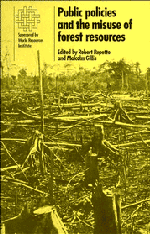Book contents
- Frontmatter
- Contents
- Contributors
- Foreword
- Acknowledgments
- 1 Overview
- 2 Indonesia: public policies, resource management, and the tropical forest
- 3 Malaysia: public policies and the tropical forest
- 4 Incentive policies and forest use in the Philippines
- 5 Price and policy: the keys to revamping China's forestry resources
- 6 Public policy and deforestation in the Brazilian Amazon
- 7 West Africa: resource management policies and the tropical forest
- 8 Subsidized timber sales from national forest lands in the United States
- 9 Conclusion: findings and policy implications
- Index of Topics
2 - Indonesia: public policies, resource management, and the tropical forest
Published online by Cambridge University Press: 06 July 2010
- Frontmatter
- Contents
- Contributors
- Foreword
- Acknowledgments
- 1 Overview
- 2 Indonesia: public policies, resource management, and the tropical forest
- 3 Malaysia: public policies and the tropical forest
- 4 Incentive policies and forest use in the Philippines
- 5 Price and policy: the keys to revamping China's forestry resources
- 6 Public policy and deforestation in the Brazilian Amazon
- 7 West Africa: resource management policies and the tropical forest
- 8 Subsidized timber sales from national forest lands in the United States
- 9 Conclusion: findings and policy implications
- Index of Topics
Summary
The deforestation and degradation of Indonesia's tropical forest is recognized as a serious problem internationally. Herein we assess the contribution of Indonesian public policies, by design or by happenstance, to the shrinkage of Indonesia's tropical forest estate in the past two decades. At least one conclusion is clear: Indonesian deforestation would have been less rapid had government policies had more neutral effects on tropical forest land use decisions; government policies and institutions have, jointly and separately, discouraged resource conservation.
Introduction
This chapter first details the extent and composition of the Indonesian tropical forest and identifies factors, other than government policies, important to forest destruction and/or conversion of the forest estate. The role of forestry policies in the process of deforestation or forest degradation, and the nonfiscal benefits expected from their execution, such as employment, regional development, and foreign exchange, are then examined. Further, we discuss the effects of non-forestry policies, such as tax policy, upon forest-based industry. This is followed by a consideration of the contribution of other policies, including resettlement policies, not designed as forest policies per se but with significant implications for the future of Indonesia's tropical forests. Finally, the chapter focuses on the degree to which Indonesian citizens have been compensated for the extraction of what must be considered now as an essentially non-renewable resource from the fragile tropical forest ecosystem, in terms of both fiscal and non-fiscal benefits. Instruments for capture of these benefits have included both forestry and non-forestry policies. Evidence suggests that these policies have been highly flawed, and that Indonesia has sold a valuable resource too cheaply, with relatively little to show for two decades of large-scale forest resource utilization.
- Type
- Chapter
- Information
- Public Policies and the Misuse of Forest Resources , pp. 43 - 114Publisher: Cambridge University PressPrint publication year: 1988
- 30
- Cited by



